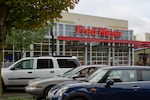
The Hawthorne Fred Meyer store is pictured in Portland, Ore., Monday, Sept. 23, 2019. A local union representing grocery workers from across Oregon and southwest Washington is urging the state to move up grocery workers' vaccine eligibility.
Kate Davidson / OPB
For the last year, most people have dramatically decreased the number of interactions they have outside their immediate family. A trip to the grocery store has often been the biggest — and riskiest — outing of the week.
But for the workers at those stores, it’s been a different story.
“While so many folks sat at home, my members drove to work when there wasn’t any traffic on the road and had lines waiting for them at work of folks wanting to buy, you know, toilet paper and Lysol and all that,” said Dan Clay, president of United Food and Commercial Workers Local 555, a union that represents 28,000 grocery, retail, manufacturing and healthcare workers in Oregon and SW Washington.
A lot of those workers are at the region’s largest grocery chains like Fred Meyer, Safeway at Albertsons, and it hasn’t been easy for them.
“We have had numerous examples where a customer has engaged with one of our members,” Clay said. “And in some cases, they pulled off their masks and spit at them because of their anger over being even asked to wear a mask.
“It’s been hell over the last year for them.”
As of this week, Oregon has administered 1 million doses of the COVID-19 vaccine. It’s a huge relief to healthcare workers, teachers and older adults. But Gov. Kate Brown’s plan for future vaccinations designates that grocery workers in Oregon aren’t eligible for vaccination until May 1. Brown’s focus has been on getting students back to school.
Meanwhile, Washington Gov. Jay Inslee said this week that grocery workers will be eligible along with many other essential workers in just over two weeks, on March 22.
In a statement, UFCW local 555 said, “Governor Brown should follow Governor Inslee’s competent lead: put people before politics and bring grocery workers to the front of the vaccination line.”
“We think that makes sense and not only do we think that makes sense,” Clay said, “the Center for Disease Control thinks that makes sense.”
CDC guidelines advise that essential workers like grocery store workers be vaccinated ahead of people aged 65-74 years. But Brown’s plan has older adults eligible for vaccination now, while grocery workers will wait another eight weeks.
“My members have to come face to face with the virus every day,” Clay said. “They’re taking on significant risks, and generally in society when people take on significant risks we also step up to make sure those folks have significant protections as well.”
Beyond vaccine eligibility, Clay says grocery workers still need more protections if they do contract a case of COVID-19.
“Under Oregon’s work comp laws, it’s almost impossible to get an employer-covered, self-insured work comp plan to cover a COVID infection because it’s impossible to prove that’s where you got it,” he said. “A lot of folks in retail don’t have insurance: it’s expensive, and retail doesn’t pay a lot.”
Clay said that lack of insurance forces many workers to hold off on treating a potential infection until they can no longer ignore it. That leads to escalating medical bills, as well as a greater risk to the general public.
“We’ve wanted some support, like making sure these folks get to go to the doctor,” Clay said, “and we haven’t seen those kinds of things.”
Ultimately though, Clay says the wait for vaccine eligibility is frustrating for workers who’ve been lauded as essential since the beginning of the pandemic. He said he hopes Governor Brown and the OHA will hear his union’s call to move grocery workers up in the eligibility queue.
“If you’re an essential employee I think that makes sense,” he said. “I think you deserve that.
“You can ask any essential employee out there. What’s in their mind? That I get called essential, but I get treated as if I’m disposable,” he added.
Listen to Dan Clay’s full conversation with OPB Weekend Edition Host John Notarianni using the audio player above
